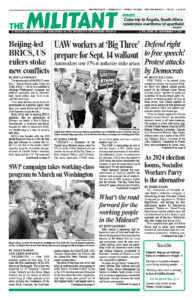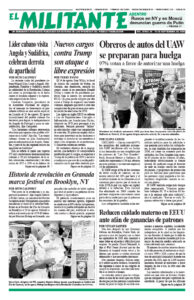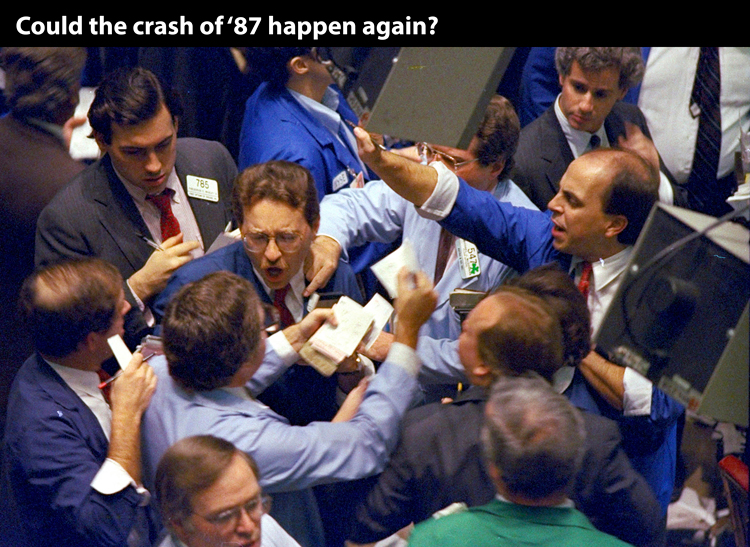The French edition of Is Socialist Revolution in the US Possible? by Mary-Alice Waters is one of Pathfinder’s Books of the Month for September. It features talks the Socialist Workers Party leader gave as part of an extended political debate addressing this topic at the 2007 and 2008 Venezuela International Book Fairs. The excerpt is entitled, “The class battles ahead are inevitable, their outcome is not. That depends on us.” Copyright © 2017 by Pathfinder Press. Reprinted by permission.
I also want to thank the National Book Center, CENAL, the organizer of the Venezuela International Book Fair, for the important initiative its national leadership took last year in organizing the fair’s rolling five-day debate on the theme, “The United States: A Possible Revolution.” …
It is not by accident that the New York Times, the US daily newspaper most influential in molding bourgeois and petty-bourgeois opinion, just this week disparagingly singled out that event by name as an example of how divorced from reality all of us here in Venezuela are. How divorced from reality all revolutionary-minded workers are, everywhere. … That we should think events like the Venezuela International Book Fair, which promote reading and culture and civil debate among working people, point a way forward for humanity.
As we said last year, however, the question of whether socialist revolution is possible in the United States is no small matter. Its “answer, in practice, will ultimately determine the future of humanity — or more accurately, perhaps, whether there is a future for humanity.”
What most struck me in rereading last year’s presentation was the list of assumptions one would have to make to reach the conclusion that socialist revolution in the US is not possible. And then thinking about what has begun to transpire in the world in just the last twelve months!
“To reach that conclusion,” we said, “you would have to believe that there won’t again be economic, financial, and social crises, or devastating world wars, on the order of those that marked the first half of the twentieth century. That the ruling families of the imperialist world and their economic wizards have found a way to ‘manage’ capitalism so as to preclude shattering financial crises and breakdowns of production and trade that could lead to something akin to the Great Depression. …
“You would have to be convinced that competition among imperialist rivals, as well as between them and the more economically advanced semicolonial powers, is diminishing not sharpening. …
“Most important, you would have to believe that capitalism’s profit rates, which have been on a long downward curve since the mid-1970s, are now going to begin to rise for several decades at an accelerated pace.”
In other words, you would have to think that the imperialist epoch with its inevitable conflicts, described by Lenin nearly a century ago, has been superseded by something new.
A year ago when we were discussing these questions here in Caracas, the main US stock market index, just a few weeks earlier, had closed at its all-time high of a little over 14,000. Yesterday it swung wildly by almost a thousand points, from under 8,000 — more than 40 percent below that peak — to close at almost 9,000. These manic fluctuations have become so much a daily occurrence as to become commonplace. And everyone knows they simply announce another plunge. …
Trillions of dollars of what Marx called “fictitious capital” have been “lost” in the last year — and so have the very non-fictitious homes and savings of millions of working people. Yet the bottom is not in sight.
The financial panic of banking capital is the symptom, however, not the disease.
What seemingly started as a capitalist crisis centered in credit and banking has now shown itself to be something of a different dimension. Its roots lie in the extended decline of the rate of accumulation of capital, the devastating contraction of new investment in plant, equipment, and hiring. As the de facto bankruptcy of General Motors bears witness, the deepest contraction of industrial production and employment since the opening decades of the last century has accelerated dramatically. Some two million workers have been thrown out of work in the US since the beginning of this year — already the greatest annual loss since the end of World War II.
The inevitability of such a contraction has underlaid this worldwide crisis from the beginning.
It is worth reminding ourselves that the Great Depression of the 1930s was not the consequence of the stock market crash of 1929 and subsequent banking crises alone. Its deeper origins are found in the violently intensifying competition among capitalist powers in the years leading up to World War I — competition for colonial possessions, access to markets and raw materials, and inexpensive sources of labor to exploit —and the economic and social breakdowns and financial catastrophe that accompanied that first interimperialist slaughter and its aftermath.
It took the global carnage of the Second World War, which included massive physical destruction across Europe and Asia from 1939 to 1945 — and, above all, the postwar military, economic, and financial dominance of US imperialism — to lay the basis for the exploiting classes to pull out of that crisis. They did so first in the US and Canada, and then slowly across devastated Europe.
That is important. As Lenin stressed, there is no hopeless situation for capitalism. The two decades from 1930 to 1950 showed once again that the dons of finance capital, if they are not replaced beforehand by the workers and rural toilers, can dig themselves out of any crisis — by inflicting enough bloody defeats on the working classes and taking over enough of the world’s destroyed industrial capacity.
The only question is the price the toilers will be made to pay.
And the only solution remains taking the power to inflict these horrors — state power — out of their hands, once and for all.


